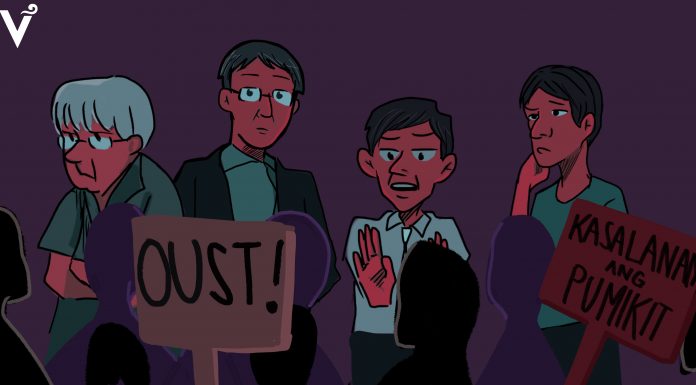 CHEMICAL Engineering freshman Justine De Guzman feared coming late for her earliest class during the first day of school. With only five minutes left before the clock turned to seven, she was still cast adrift along the corridors of the Roque Ruaño Building.
CHEMICAL Engineering freshman Justine De Guzman feared coming late for her earliest class during the first day of school. With only five minutes left before the clock turned to seven, she was still cast adrift along the corridors of the Roque Ruaño Building.
“I was going around in circles because I was clueless on how to reach our classroom,” she recalled.
Unaccustomed to the twists and turns of her new environment, a feeling of hopelessness started to form in her mind—was she going to make it on time?
“It was a good thing an upperclassman approached and helped me by giving the right directions,” De Guzman said.
A scene like this during the first day of school is typical for Thomasian newbies who experience occasional blunders as they enter a new phase in their scholastic life.
New world
De Guzman, who graduated valedictorian out of only 21 students in high school, said she was surprised with the huge number of students in UST.
“I saw the same faces in high school every day,” she said. “Although it is easy to make friends in college, I encounter many different faces and it gets hard to remember each and every one of them.”
Originally residing in Dagupan City, Pangasinan, De Guzman now stays with her brother in a condominium unit in Binondo. She said it was hard for her to adjust because it was the first time she would live far from her parents.
“Before, I was financially dependent on my parents. But now, I could not rely on them that much because they could not just send me money immediately,” said De Guzman, who now has to budget her money wisely.
De Guzman also shared that she only has the luxury of returning back to their province during semestral breaks.
Despite the changes she experienced in adapting to her new environment, she expressed a sense of happiness over the new-found freedom she enjoys in college.
College culture
After studying in an exclusive school for 14 years, Industrial Design student Cristina Guanzon shared how anxious she was to be part of UST.
“In UST, we [girls] have to act more proper because there are guys around,” said Guanzon, who was admittedly more carefree in high school.
“[In high school], we could even lie on the floor,” she said.
Unlike the usual 7 a.m. to 5 p.m. classes in high school, De Guzman and Guanzon delight over their college class schedules that consist of two to three-hour breaks.
De Guzman said she was accustomed to her previous school’s spoon-feeding approach to teaching that she had a hard time adjusting to college education which puts premium on independence and self-reliance.
“In high school, if you don’t understand the topic, there were teachers kind enough to repeat the whole lesson. In college, it is up to you to adjust and catch up with their pace,” she said.
Despite the pressure, De Guzman lauded the teaching method of her professors because they do not spoil their students, and gives them a chance to grow and gain more knowledge through their own initiative.
“I don’t mind if our professors pile us up with homework and ‘plates’ because I’ve been interested in drawing ever since,” said De Guzman, adding that the strict implementation of deadlines is one of the things the University and her former school have in common.
“Dealing with deadlines is easier for me now,” she said.
The two freshmen also recalled how they loved the University’s wide array of food choices, contrary to the usual and “expensive” cafeteria food they had in high school.
“The food choices in our high school were limited,” said Guanzon, adding that the assortment of food establishments in UST catered to the diverse taste buds of students.
Inevitable stage
According to sociology professor Josephine Aguilar-Placido, culture shock is an inevitable stage in life encountered by every individual.
“You experience shock because you are not used to the present culture you are in,” Placido said. “It’s practically moving out of your comfort zone.”
She added that college must be perceived by freshmen as a challenge and not as a burden.
“Face all the challenges with confidence because every college student has to do so. There’s always a room for adjustment, change, and acceptance,” she said.
To successfully overcome culture shock, Placido advised students to immerse themselves to their new environment.
“The freshmen should expose themselves in what they see around,” she said. “To survive college, you have to save your skin.”
Placido further said that since college students are given independence to act upon their will, they are expected to cope with the rapid pace of their suroundings.
“Since you are on your own, diskarte lang,” she said.













